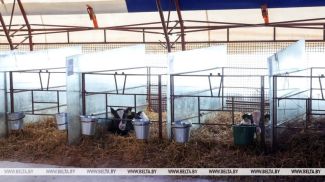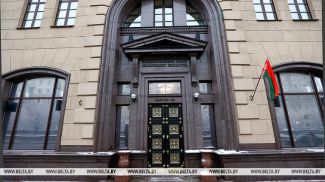MINSK, 23 November (BelTA) – Food prices in Belarus will continue rising due to objective factors on the world market, however, the government will use various tools to slow down the growth as much as possible, BelTA learned from Deputy Prime Minister of Belarus Aleksandr Subbotin. The deputy prime minister is in charge of overseeing agribusiness.
The reporters wondered how rising international demand and food prices will affect the situation in Belarus.
There will be no shortages for sure
“I can say that there definitely will not be any shortages. Because we make many times more food that we need. And because we prioritize domestic food security and the provision of the domestic market. It is an axiom,” Aleksandr Subbotin stressed.
Price growth is unavoidable
It is impossible to avoid rising prices due to the situation on the global market, Aleksandr Subbotin noted. “If we start stifling prices on the home market while prices in the Russian Federation are more attractive, even ordinary people will start moving the food to Russia. There will be spillover in any case. We don't have a border between Belarus and Russia after all,” he said.
Apart from that, the goods that affect the end value of agricultural products are getting more expensive, including fertilizers, some imported components, spare parts, and other things.
The government is working hard to slow down price growth
“Prices for everything are getting higher due to objective reasons. This is why we cannot slow down price growth without damaging interests of the producers. But there are ways we can offset these price hikes such as individualized support for low-income Belarusians, limits on profit margins of retail chains,” Aleksandr Subbotin noted.
“The government is aware of all these mechanisms and actively uses them. And we are trying to slow down price growth as much as possible,” the official stressed.
Export is on the rise and it is a plus
Rising world prices for food have another effect on Belarus. In addition to satisfying the domestic demand the country exports a lot of food. Belarus President Aleksandr Lukashenko wants to increase food export up to $7 billion.
Aleksandr Subbotin believes it is difficult to achieve this goal. In January-September 2021 Belarus' food export was already close to $4.7 billion, 112.6% as against January-September 2020. Reaching $7 billion will depend on the market situation. “But we will try to do it as fast as possible. I don't want to make projections. We may achieve this figure within two years or three years. We are working on it,” he said.
On the whole, Belarusian producers are raising export volumes by exporting more and by charging more for their products. “Prices are really getting higher all over the world. The United Nations Organization mentions it, all the agrarian agencies do. Prices for bread, meat, milk, and ordinary grain. Prices are rising unbelievably fast in comparison with last year. Certainly, it has helped our export a lot but we've also increased the physical volume: more milk, cheese, meat, and meat products are exported,” Aleksandr Subbotin said.
Development amid turbulence and Western sanctions
Aleksandr Subbotin noted that this year's farming season was one of the most difficult ones in the country's sovereign history. “Nevertheless, we are gradually gaining despite everything going on around us, despite political and financial turbulence, despite spiking prices for energy resources and fertilizers,” he said.
The reporters also wondered whether the sanctions had affected Belarusian food export. Aleksandr Subbotin remarked that in international practice sanctions usually do not target things like food and medications.
“Nobody has stopped buying food. Our positions in 116 countries remain solid. We've traded with slightly more than 100 countries this year due to the market situation. But we have market access in 116 countries. Belarus' export to the European Union is rising despite the complicated relations with the European Union. They protect their market very strongly and deny access to our dairy products, cheese, but they buy very well some lineups of our food products, particularly industrial casein for their own manufacturing,” the deputy prime minister of Belarus said.













